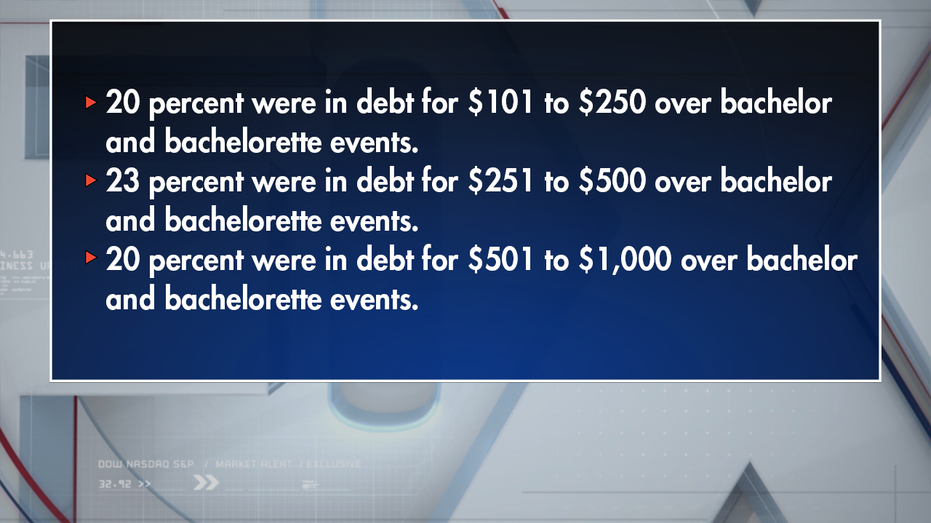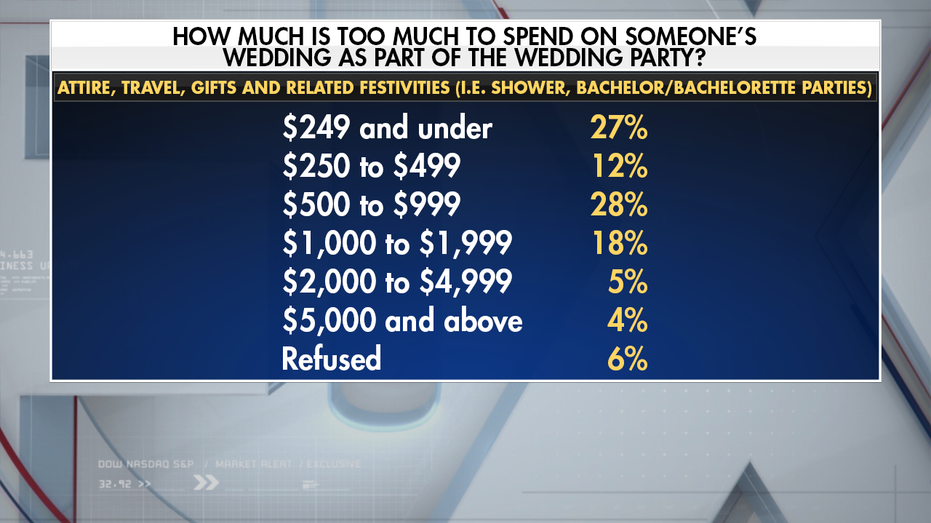Wedding party spending: Here's how to avoid debt when a loved one gets hitched
People are going into debt to attend weddings.
More than a third of wedding guests and pre-wedding event attendees reported racking up more than $500 in charges, according to a Credit Karma survey. For those who are popular enough to get invited to four or more weddings per year, means they can potentially spend up to $4,000 or more if they maintain these habits.

The pressure is on for anyone selected to be a part of a wedding party or bachelor/bachelorette celebrations. Based on its findings, roughly 20 percent of these intimately acquainted wedding guests have gone into debt before the couple has even said “I do.”
The reason? To impress and not disappoint the marrying couple, according to the Credit Karma’s report.

The reasonings were also similar for those who attended wedding day festivities.
To get an idea of why costs appear to be going up for guests, FOX Business consulted Elaine Swann, a former wedding coordinator and etiquette expert about what are reasonable expectations as well as when it is the right time to dip out of celebrations.
“As far as weddings are concerned, more often than not especially nowadays since people live so far from each other or they’re attending destination weddings – a lot of it has to do with travel, the gifts that you give, and then, of course, all the celebrations that surround the wedding,” Swann said.
To combat the chance of building harmful debt in the most eloquent way, Swann advises wedding guests take into account how close they are to the marring couple. For coworkers, she said $50 is a good starting point for a gift. However, it is advised to scale the amount upward for the weddings of family members and friends.
For those who are in the wedding party, the answer is a bit more complicated than gifting.
“This is something that is very traditional. Anytime you do join in on a wedding party, some of the obligations you’re expected to pay in are: be prepared to contribute to the bachelor or bachelorette party. It’s definitely customary for the wedding party to do that in the sense of covering expenses for the bride and groom that night,” Swann explained.
Streamlining the payment process with today’s many peer-to-peer money transfer services is one way for wedding parties to work together and keep track of spending, according to Swann.
Other responsibilities that are usually expected when accepting a wedding party role includes attire and grooming. Anyone who is not comfortable with these conditions should turn down position and opt to be a regular guest instead.
Bankrate’s “Navigating The Cost Of Wedding Season” survey, revealed that most Americans believe spending up to $1,999 as a member of the wedding party to be too much.

“In the case of destination weddings, your presence is a present,” Swann noted.
She went on to say that brides and grooms who choose to tie the knot in exotic locales should be considerate of this when making wedding plans. To help guests prepare and keep costs low, Swann said a couple should aim to give a year’s notice. Providing as much time as possible for guests to get their funds together is usually the best approach.
However, for couples who haven’t opted to travel far to get hitched, keeping the event local will ensure a level of savings and encourage participation.
“Look at the wedding that you want and your actual guest list and take their lifestyle into consideration as you plan this wedding. If most of your friends are recent college grads and you’re still entering into the workforce, then you probably want to avoid planning a really extravagant wedding,” Swann pointed out.
She also noted that doing this will mitigate friction in the relationship.
“Everything from the jetlag to the money you spent out of your bank account, it’s not unusual for people to develop resentment because they didn’t speak up for themselves or felt pressure in going,” Swann said. “You can harm the relationship if you try to force it.”
Depending on one’s finances, it is perfectly acceptable to skip out on some of the festivities leading up to the wedding, however it is important to give notice to the marrying couple. Moreover, for anyone who can’t afford to attend a wedding or would prefer not to attend, Swann said there is no harm in declining.
“If you can’t attend, you can’t attend. What a lot of people do is put a lot of pressure on their own lives.” Swann added. “Depending on how close you are to the person, then unless someone is footing the bill for you, then it’s best to just forgo altogether.”
GET FOX BUSINESS ON THE GO BY CLICKING HERE
According to Swann, it is customary to send a gift in lieu of one’s presence when declining a formal invitation. Anyone on the fence about what to send, she said, “The absolute best type of gift to send nowadays is the gift of money. It’s the one gift we know for sure the bride and groom will use.”

The same is true for anyone who had previously said yes in an RSVP and experiences a conflict along the way.
In Swann’s own words, “Let the bride and groom know when you can no longer attend the moment that you know. If it’s a last minute thing like work and you can’t get time off or something like that or your childcare fell through or your finances didn’t come together, the moment you know, that’s when you should inform the bride and groom.”




















